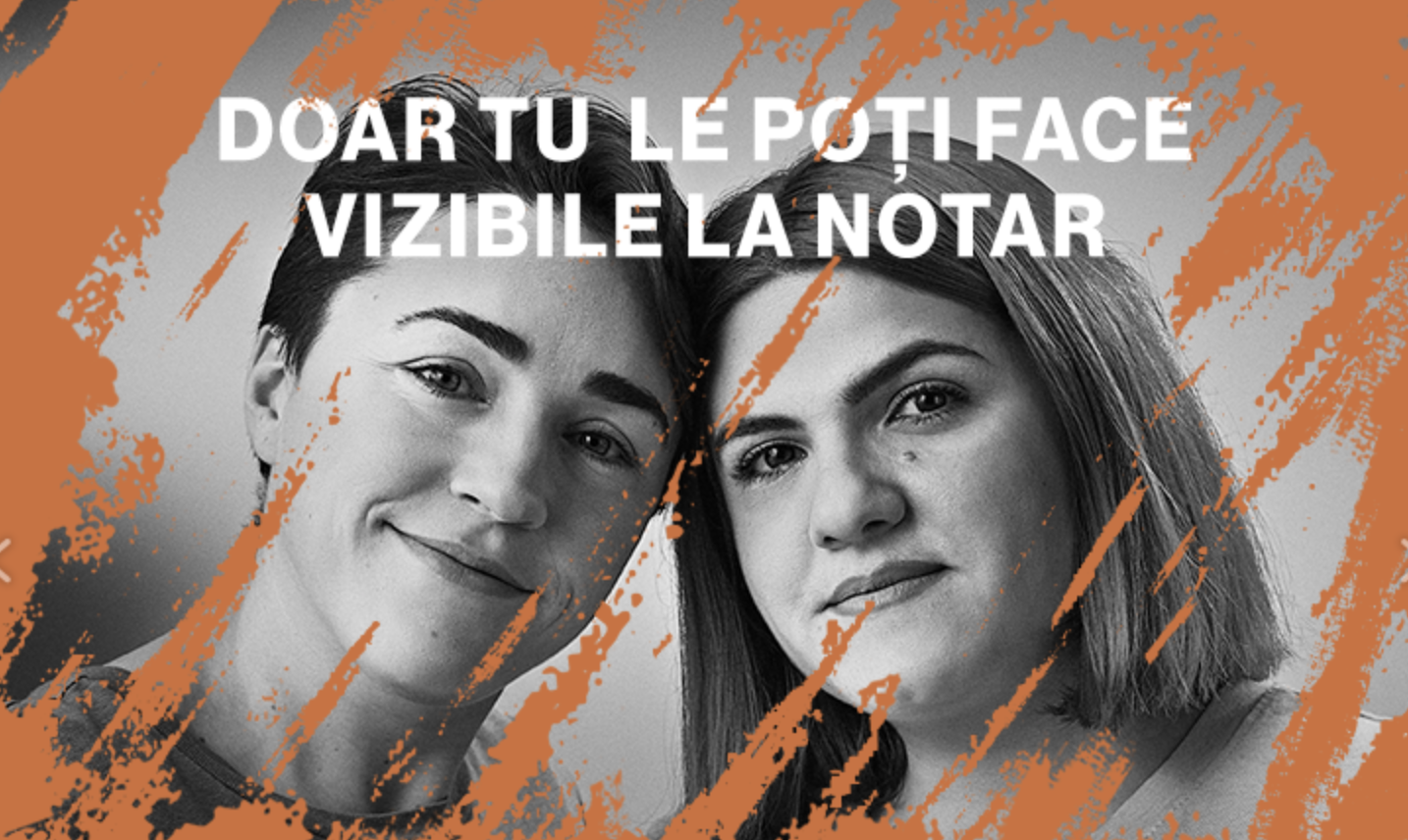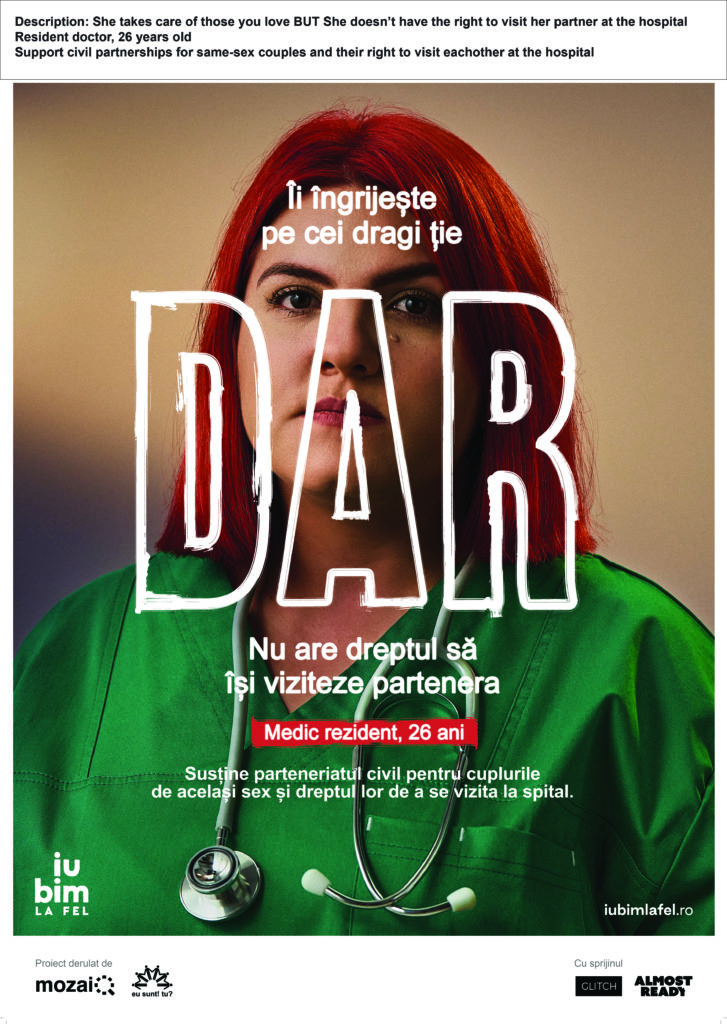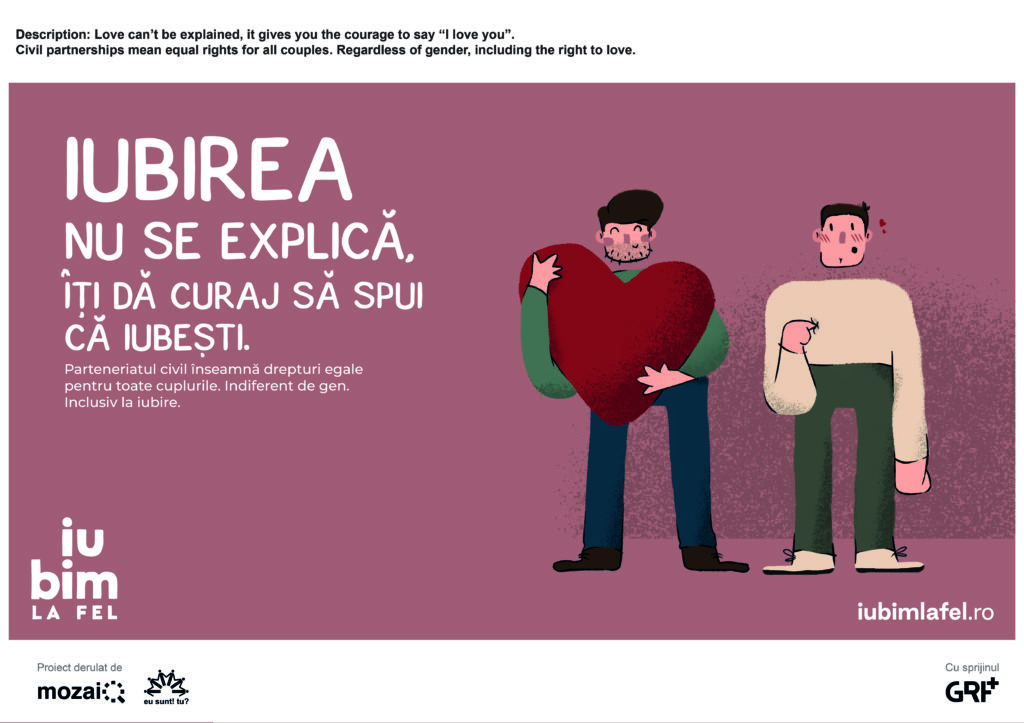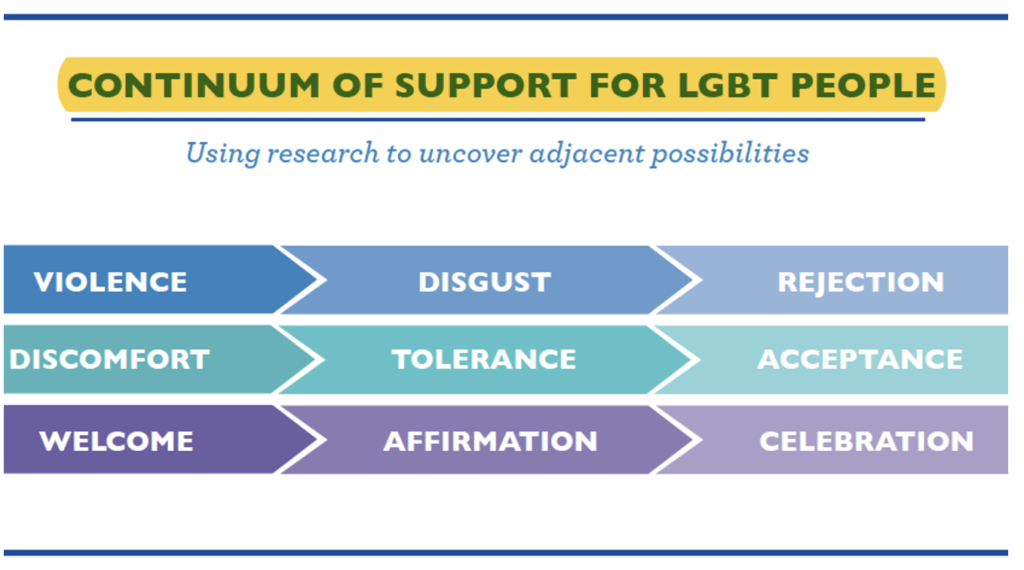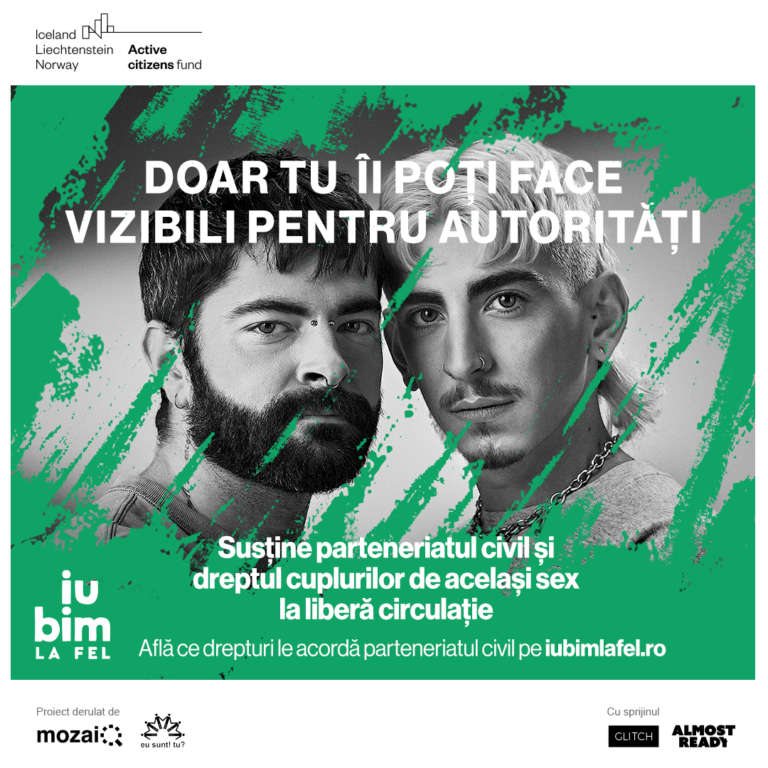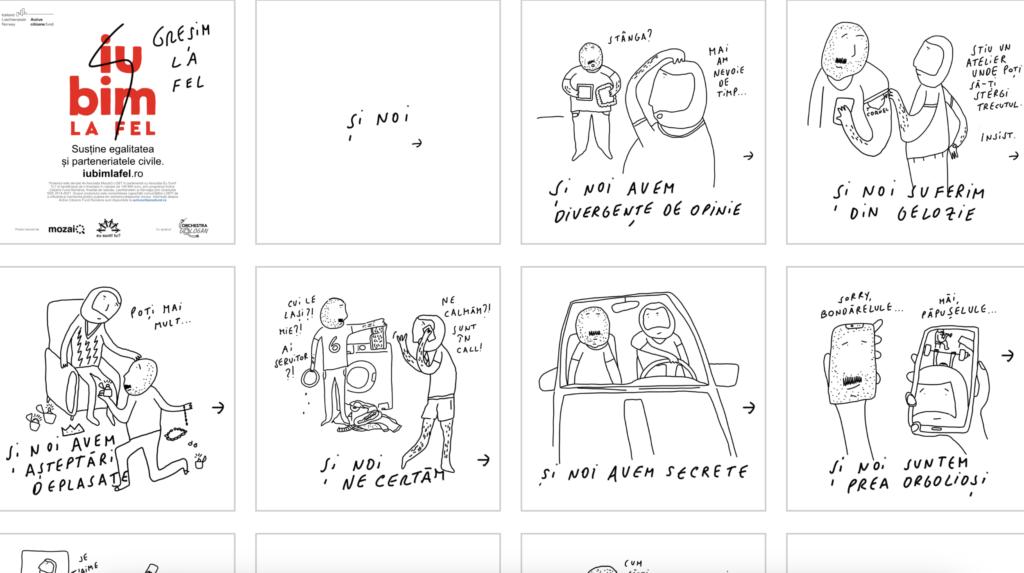A tough context, but full of opportunities
Romania is among the last five EU countries that, despite legal obligations under European and international rulings, still do not recognize same-sex couples,
Even though fifteen EU nations now allow same-sex marriage and seven more recognize civil partnerships, the Romanian authorities have blocked over 10 proposals in the past two decades.
Meanwhile, public support is growing, with 50% of young adults supporting same-sex marriage and 70% of Romanians declaring they would accept an LGBTQ+ child. .
This growing support was brought to light and amplified when an alliance of LGBTQ+ organisations and supporters successfully campaigned for the boycott of a referendum organised by a conservative coalition. The referendum aimed to change the constitutional definition of marriage by restricting it to the union of a man and a woman.
In the wake of this success and in view of continued inaction by authorities, LGBTQ+ organisation MozaiQ rolled up its sleeves again in 2023 to launch a further campaign in support of the civil union agenda.
A new campaign, building on research
The “We Love the Same” campaign was developed in partnership with 14 communication agencies, all of which worked on a pro-bono basis. The campaign emphasised the universal nature of love, regardless of gender.
Each of the 14 agencies developed its own concept to represent the idea of civil partnerships for same-sex couples. This ensured a great diversity of approach and audiences targeted.
Maximilian A., MozaiQ’s communication officer stated “We really loved this aspect because it highlights the diversity not only within the LGBTQ+ community but also in the range of opinions across Romanian society. For example, this campaign uses figures and data, which is something that is not usually advised in communication so it was very interesting to see that the people from advertising decided to do this.”
Insights from research, including results from a barometer survey, shaped the campaign strategy. This research revealed the societal values and perceptions of LGBTQ+ individuals across various segments of Romanian society, thus enabling targeted and impactful messaging. See below for detailed results.
According to Max, “At the beginning, as part of the campaign’s inception, we shared data from the barometer survey and personal stories from the community with all the agencies, allowing them to interpret and use the information as they saw fit. Each agency brought their own ideas to the table, and we gave them the freedom to explore whatever they wanted, as long as the concepts weren’t problematic. We suggested minor modifications when needed or gave them a green light straight away.”
A diversity of campaign approaches
Thanks to the diversity of comms agencies involved, the campaign developed several approaches:
1) Testimonies from LGBTQ people highlighting the need for the rights and benefits that civil unions allow.
2) Short very funny videos staging conversations between straight people evidencing the harmlessness of civil unions for them and the irrelevance of the opposition’s arguments, while also clarifying the exact object of the civil union thereby dispelling the narrative that they would have a negative impact on society at large.
| If your browser does not support autotranslation, here is the text:
Yes… and ? No… I’m saying what’s your problem with that? So What? Will that beautiful hair of yours fall out if they do ? Will it make you put on weight? Will you lose your job? What difference does it make to you? Yeah, so two girls are gonna be able to buy a house together. They wouldn’t have been interested in you even if they were into men. Of course I’m pissing you off. Of all the people I know you are the only one who calls me about stuff like this. Give me a break man, if you’d had a day like mine you wouldn’t give a shit either. Bye (he hangs up) You gotta be kidding me. Message: Your life won’t change, but lives for same-sex couples will. Support civil partnerships. |
3) Clarification messages about the rights that civil partnership bring, such as the one with the doctor that cannot even visit her own partner in hospital.
Caption : “She takes care of those you love BUT She doesn’t have the right to visit her partner at the hospital Resident doctor, 26 years old
Support civil partnerships for same-sex couples and their right to visit each other at the hospital”
4) Social media assets with powerful slogans such as
“Love can’t be explained. It gives you the courage to say ‘I love you’.”
“Love is blind. Laws shouldn’t be.”
Pathway to change
This multi-pronged approach aimed to increase empathy with LGBTQ+ people whilst driving home the anti-referendum campaign strategy, which was based very much on generating indifference.
The continuum of support theory indicates that attitude change has to follow a certain pathway and that a campaign can’t hope to get its audience past one or two of these degrees.
In this case, “indifference” is clearly identified as a stepping stone on that pathway. The target audience, according to the people portrayed in the videos, is composed of 30-40 year olds city dwellers on low to medium incomes..
Conformity effect
We all know from personal experience the power of l social conformity. Countless experiments across a variety of contexts (geographic and demographic) have shown that attitudes and behaviours are mostly defined by observing the people around us. .
With the claim “Of all the people I know you’re the only one that calls me about stuff like this”, the video cleverly indicates that indifference is the dominant attitude. This is credible whereas trying to portray support for LGBTQ people as the majority norm would not have been. This claim assigns opposition to LGBT rights to a minority position.
| If your browser does not support autotranslation, here is the caption:
I can’t talk right now. I see. Yeah but honestly I couldn’t care less. Look, my kitchen floor is flooded, my filling just fell out, I’m broke and have no money for the dentist or a plumber. Do you think I give a shit whether civil unions are going to be legalised? Yeah right. So two people are going to be able to visit each other in hospital if they get sick. What difference does it make to you? Does it mean your unemployment benefits will be cut? Of course I want you to find a job, even though you’re so stupid. Yes, I think you’restupid… I’m pissed off with you! Is this really your problem now? 3 months without a job and this is all you can think about? “Oh my God civil partnerships!” Seriously? (…) How’s Mum? Okay give her a hug for me. I got to go. Love you, bye (she hangs up) You gotta be kidding me!
Message: Your life won’t change but lives forSame-sex couples’ will. Support civil unions. |
Family values
Interestingly this video leverages family values by making reference to a “Mum”, which signals that this is a conversation between siblings. , However, it stays clear of portraying children, which could trigger negative narratives and awake fears around adoption by same-sex couples, a topic that is used by conservatives for scaremongering.
You can find more on framing with family values in lesson 6 of our online course on campaigns communication
All agencies involved developed their own items
The agencies involved also developed additional campaign items, such as posters highlighting messages that LGBTQ+ people would typically share such as “We’d like to move in together!”. This shows that these are things any couple might say. Max emphasises “It was a way to say, “Hey, we’re just ordinary people.” A lot of people in Romania don’t know anyone LGBTQ+ and think we’re kind of weirdos, but this helped show that we’re really not. “
Specific items also included visuals and posters with powerful slogans such as
“Love cannot be explained, it gives you the courage to say ‘I love you’.”
“Love is blind. Laws should not be”
This is a line
Dissemination is key
The dissemination strategy included street billboards, social media promotion, and radio messages. Despite financial constraints limiting TV presence, the campaign achieved an estimated cross-platform reach of 8–10 million people—nearly half of Romania’s population. According to Max’ sources “2 million people saw our billboards, 500 000 people watched our videos on YouTube, 130 000 heard about the campaign on the radio, and 22 000 visited the campaign website.”
The assessment of the impact of the campaign is still underway. Max points out “it’s hard to pinpoint changes in opinion across so many media. However, a recent study by ACCEPT, another organisation, found that 40% of people now support gay marriage, up from 34% before the campaign.”
Still in progress, the campaign continues to advocate for legal recognition and societal acceptance. It has sparked vital conversations, keeping the movement for equality alive in Romania.
Max concludes: “-The campaign is ongoing—it is far from over. We still have plans to get on TV. Even now, a year later, the agencies are still working on it, completely free of charge.”
|
Barometer results
|

